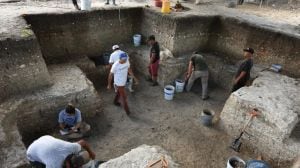Saga of a struggle Madibas story
Based on his autobiography of the same name,Mandela:Long Walk To Freedom tells the personal story of the man in the backdrop of his movement.
You could make the most wonderful documentary about Nelson Mandelas life, Justin Chadwick says,and it would be 25 episodes long.
Chadwick didnt have that luxury,however. As director of Mandela: A Long Walk to Freedom,based on the iconic South African leaders autobiography,he had only two-and-a-half hours to tell that story.
With this film there was an opportunity to tell a personal story,a love story,a story about forgiveness, he says. As much as the backbone is the apartheid history,it has to be a moving cinematic experience. And the film has to have a point of view,given that this was coming from Mandelas source material,Long Walk to Freedom.
The 44-year old British director best known for the BBC miniseries Bleak House (2005) and the historical drama The Other Boleyn Girl (2008) admits that he found tackling Mandelas story a tall order.
The film tracks the life of Mandela (Idris Elba) known to his people by his tribal name,Madiba from his childhood in a small hilltop village in South Africas Eastern Cape among the Xhosa-speaking Thembu people through his early years in politics,his life sentence for attempting to overthrow the apartheid government and,finally,his release after 27 years in jail and his eventual election as president.
For Chadwick,however,the core of the film was its exploration of Mandelas personal life,including his marriage to Winnie Madikizela (Naomie Harris) and his close friendships with fellow African National Congress leaders such as Ahmed Kathrada (Riaad Moosa) and Walter Sisulu (Tony Kgoroge).
I had access to those people before I started to put the screenplay together with Bill Nicholson, the director recalls. The film was going to be about love and forgiveness,as much as it was about apartheid. That central love story about the cost to the man,the cost to his children,the cost as a father and a husband.
Chadwicks access to influential figures in Mandelas life came through Anant Singh,the South African-born producer of films such as Sarafina! (1992) and Cry the Beloved Country (1995). Mandela invited Singh to read the manuscript of Long Walk to Freedom before its publication and later awarded him the coveted rights to adapt it to film.
His response was I trust you. Dont bother me, Singh says.
From the outset,Chadwick says,he was determined to show the humanity and,yes,the flaws of his characters. Mandelas philandering is acknowledged,as is the controversy over Winnie Mandelas role in fraud,kidnapping and human-rights abuses.
South Africa talks about the Madiba effect, Chadwick says. I met him just before his 94th birthday,and it was literally like electricity radiates off him. And they said that,when he met Winnie,she was 23-year-old,beautiful,intelligent,strong-willed,with a great energy coming from her.
The main thing was casting them, he continues. I had an instinct about Elba. Hes subtle and he has a star quality. We know Mandela when he came out of prison as this thin man,lean,but Mandela was a boxer. He was a fighter and he was a big guy.
Elba,a well-built,6-foot-3-inch,41-year-old Londoner best known for the television series The Wire (2002-2004) and Luther (2010-2013),was not only Chadwicks first choice but also that of Mandelas daughters.
British actress Naomie Harris was cast as Winnie Mandela. Harris was the only person I had considered, Singh says. Even Winnie said that she did a remarkable interpretation of her.
Both Elba and Harriss performances have garnered praise from critics,more than the film itself. Varietys chief film critic Scott Foundas said that Idris Elba gives a towering performance,a Mandela for the ages.
The film was shot in South Africa,as much as possible in the locations where important moments of recent history had taken place,often with spectators who had witnessed those events.
Some have suggested that the timing of the films release,not long before next years general elections in South Africa,will be an unfair leg-up for the ruling African National Congress. Chadwick isnt so sure. Mandelas successors in the presidency have not been as popular as he was and is,and the comparisons raised by the film might cut both ways.
In any event,he says,the film should be a useful reminder to South African voters,who for the first time will include many of the so-called born-free generation.
The legacy of Mandela is that we are all born equal,all of us, Chadwick concludes. In South Africa the struggle is still part of everyones life today. There have been great strides,but,as Mandela has always said,there is much more to do.






- 01
- 02
- 03
- 04
- 05

























